

One Laptop per Child. Activity bundles. Introduction Activities in the Sugar environment are packaged into a self-contained "bundles".
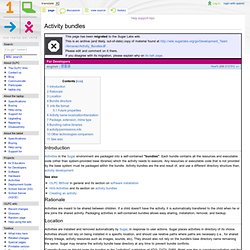
Each bundle contains all the resources and executable code (other than system-provided base libraries) which the activity needs to execute. Any resources or executable code that is not provided by the base system must be packaged within the bundle. Activity bundles are the end result of, and use a different directory structure than, activity development.
Developers/Stack. From OLPC PreviousNext There are a number of approaches (software stacks) to develop software for the OLPC environment.
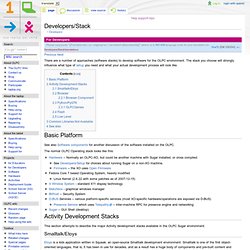
The stack you choose will strongly influence what type of setup you need and what your actual development process will look like. See also Software components for another discussion of the software installed on the OLPC. The normal OLPC Operating stack looks like this: Hardware -- Normally an OLPC-XO, but could be another machine with Sugar installed, or cross compiled. Game development HOWTO. From OLPC << Tutorials This document describes how to use the Pygame library for Python for game development -- to create a new game activity for OLPC's Sugar platform.
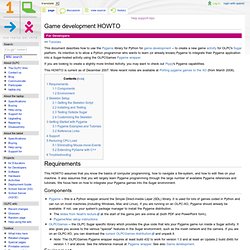
Its intention is to allow a Python programmer who wants to learn (or already knows) Pygame to integrate their Pygame application into a Sugar-hosted activity using the OLPCGames Pygame wrapper. If you are looking to create a slightly more limited Activity, you may want to check out Pippy's Pygame capabilities. This HOWTO is current as of December 2007. This HOWTO assumes that you know the basics of computer programming, how to navigate a file-system, and how to edit files on your machine.
Components Pygame -- this is a Python wrapper around the Simple Direct-media Layer (SDL) library. Environment. Getting Started. About Sugar Sugar is a desktop environment that is an alternative to the ones typically used in Microsoft Windows, Apple's OS X or other GNU/Linux operating systems.
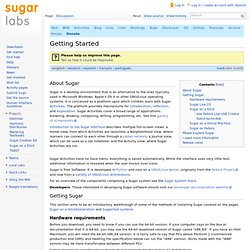
It is conceived as a platform upon which children learn with Sugar Activities. The platform provides mechanisms for collaboration, reflection, and exploration. Sugar Activities cover a broad range of applications: browsing, drawing, composing, writing, programming, etc. See this gallery of screenshots. Developers/Getting Started. From OLPC This document attempts to guide you through the first steps towards using your new XO as a development platform, and to point you to resources for project ideas and programming APIs.
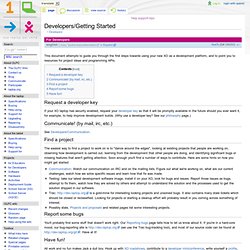
Request a developer key If your XO laptop has security enabled, request your developer key so that it will be promptly available in the future should you ever want it, for example, to help improve development builds. (Why use a developer key? See our philosophy page.) Communicate! See Developers/Communication. Contributors program. From OLPC This page is monitored by the OLPC team.
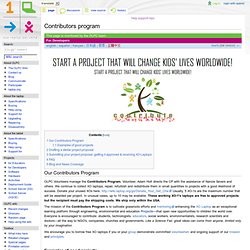
Our Contributors Program OLPC Volunteers manage the Contributors Program. Volunteer, Adam Holt directs the CP with the assistance of Nancie Severs and others. We continue to collect XO laptops, repair, refurbish and redistribute them in small quantities to projects with a good likelihood of success. The mission of the Contributors Program is to cultivate grassroots efforts and mentoring enhancing the XO Laptop as an exceptional learning platform through engineering, environmental and education Projects—that open new opportunities to children the world over. We encourage you to borrow free XO laptops if you or your group demonstrate committed volunteerism and ongoing support of our mission and principles. Examples of good projects Help our OLPC/Sugar community help others: I.E. an incredible spectrum of ideas. See the evolving list of projects as inspiration for your creative ideas. Drafting a stellar project proposal 1. 2. 3.
Developers/Projects. From OLPC PreviousNext This section tries to help you answer the question "Where should I start?
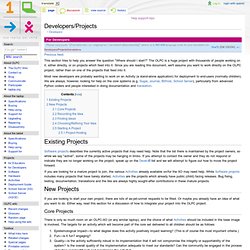
" The OLPC is a huge project with thousands of people working on it, either directly, or on projects which feed into it. Since you are reading this document, we'll assume you want to work directly on the OLPC project, rather than on one of the projects that feed into it. Most new developers are probably wanting to work on an Activity (a stand-alone application) for deployment to end-users (normally children). Software projects describes the currently active projects that may need help. Development issues. From OLPC This page has a more up-to-date location: Developers Note: The Developer's Manual provides more comprehensive and up-to-date introductions to the issues described here.
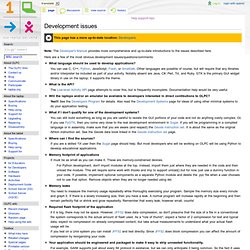
Here are a few of the most obvious development issues/questions/comments: What language should be used to develop applications? You can use C, C++, Python, JavaScript, Flash, or Smalltalk. What is the API? The Low-level Activity API page attempts to cover this, but is frequently incomplete. Sugar Labs/Getting Involved. Building the XO: Introducing Sugar. One Laptop Per Child comes closer to being a reality every day — and every day, more people are looking for ways to get involved with the OLPC project.
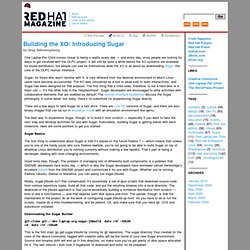
It will still be quite a while before the XO systems are available for broad distribution, but people can see for themselves what the XO is all about by downloading Sugar, the core of the OLPC Human Interface. Sugar, for those who aren’t familiar with it, is very different from the desktop environment to which Linux users have become accustomed. Make your own sugar activities. Sugar is the user interface designed for the XO laptop.
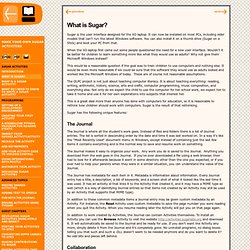
It can now be installed on most PCs, including older models that can't run the latest Windows software. You can also install it on a thumb drive (Sugar on a Stick) and boot your PC from that. When the XO laptop first came out some people questioned the need for a new user interface. Wouldn't it be better for children to learn something more like what they would use as adults?
Why not give them Microsoft Windows instead? Activity tutorial. From OLPC For up to date information on creating Activities see << Tutorials This tutorial explains step by step how to create the Hello World Activity bundle. You can download a completed .xo package, though the package will not exactly match the below contents.